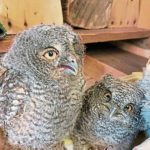Wildlife centers and the Pennsylvania Game Commission say they have been deluged with calls from people who have picked up wild animals, often in an attempt to help them.
Game Commission spokesman Seth Mesoras said the agency has received a number of calls from people who tried to take in fawns because they thought the young deer had been abandoned. But mother deer stay away from their young “to discourage predators,” he said, noting the mothers don’t go far away and reunite with the youngsters to feed them.
There also have been reports of people picking up baby raccoons, which can carry rabies.
“Nature operates differently,” Mesoras said. “Ultimately, you don’t want to touch a young animal, and you should leave it in the wild.”
Wild animals can lose their natural fear of humans, making it difficult or impossible for them to live normally in the wild, the commission said.
Wildlife that becomes used to people also can pose a public-safety risk. The commission documented a case from years ago when a six-point buck attacked and severely injured two Pennsylvania residents.
The deer had been illegally taken in as a fawn and fed and cared for into adulthood, according to the commission.
High-risk rabies vector species such as skunks, raccoons, foxes, bats, coyotes and groundhogs can transmit rabies, and residents also are at risk for exposure to disease and parasites, such as fleas, ticks and lice, the commission said.
It is illegal to take or possess wild animals. Under state law, the penalty for such a violation is a fine of up to $1,500 per animal, according to the commission.
Animal rehabber Wildlife Works Inc., based in Youngwood with a new satellite office in Mt. Pleasant, is caring for about 20 squirrels, 19 opossums, bunnies and baby birds including two Eastern Screech owls.
Late last week, the nonprofit fielded 30 calls before noon one day about potentially abandoned young animals, said Monica Leuthold, office manager and animal care volunteer for Wildlife Works.
“We try to encourage people to leave the wild babies alone,” she said. “We have been doing this for 30 years and research and trial-and-error show that young wildlife is always better off with their parents.”
The screech owls were found after property owners in Scottdale cut down a tree. The felled tree was hosting a family of the screech owls, Leuthold said.
How do you know if a young animal needs help? It’s situational and depends on how animal species care for their young, Leuthold said.
For example, you can touch baby birds that have fallen out of a nest, but not all birds need to be taken care of, according to the Audubon Society of Western Pennsylvania.
Birds grow very quickly and sometimes leave the nest before their feathers fully grow out, Audubon spokeswoman Rachel Handel said.
“When possible, please leave the baby bird alone,” she said. “That first flight doesn’t always go smoothly and a bird doesn’t know how to fly until it gives it a try.”
The parent birds are usually in the area ready to help, Handel added.
If a baby bird looks to be at risk, exposed to predators or danger, you can move it to a nearby shrub so the parents can easily find it, she said.
“It’s not true that a mother bird will abandon a chick that has been handled by humans,” she said.
To learn more about local animal rehabilitation centers, visit the websites of Wildlife Works and Humane Animal Rescue of Pittsburgh.















